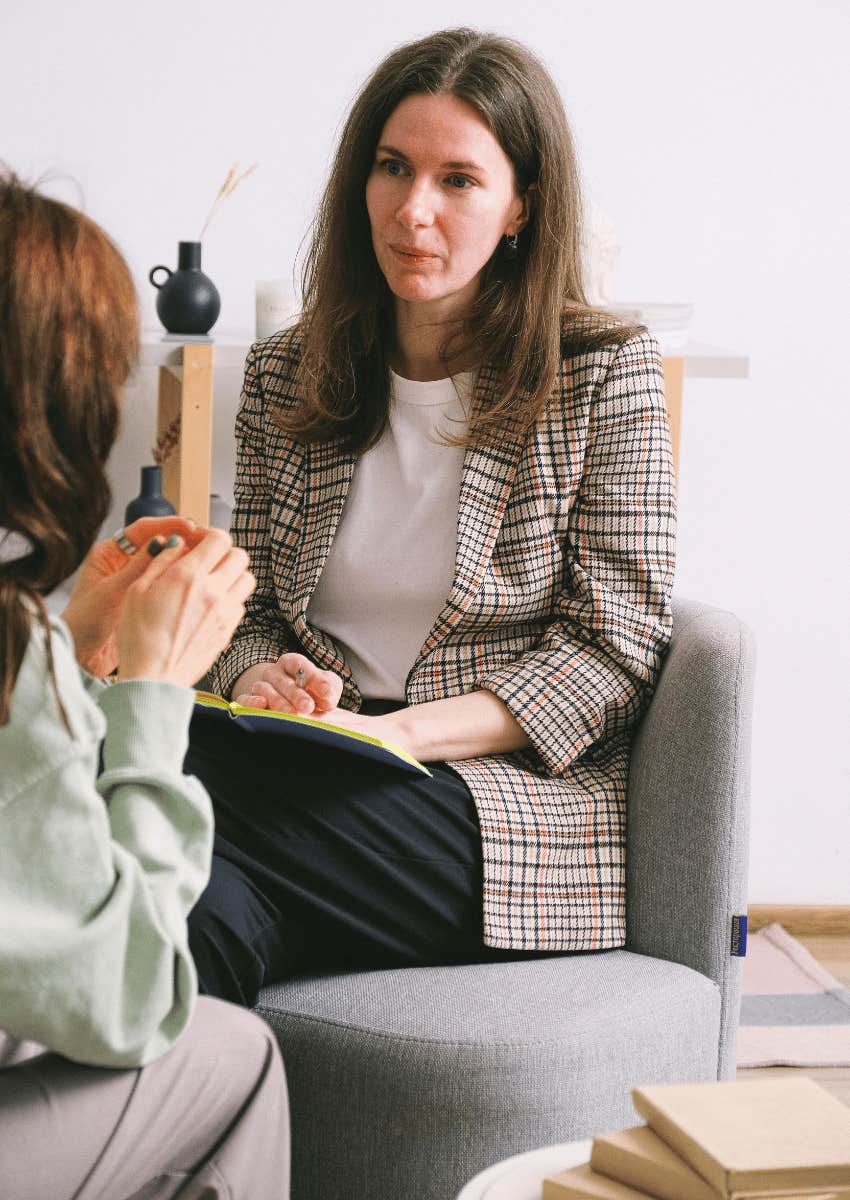I’ve Sworn Off Small Talk, And Now People Open Up Within Seconds
It’s like I have a forehead tattoo that says, “Tell me everything.”
 halfpoint | Canva
halfpoint | Canva I used to lie countless times throughout the day. It wasn’t intentional and it wasn’t malicious — but they were lies just the same. When my friends at school asked how my weekend was, I’d say “Good. How was yours?” I wouldn't tell them that I’d been up all night talking my brother out of suicide (again).
If therapists asked how I was handling my parent’s divorce or my best friend’s death, I’d say “It is what it is. Everything happens for a reason. There’s always a silver lining.” Sugar-coated platitudes usually got me off the hook.
In relationships, I joked about everything and highlighted only my chillest qualities — never the deep, dark secrets riddled with insecurities: I’m afraid I’m unlovable. Too messy. A commitment-phobe. A sociopath.
It turns out that I was not a sociopath — far from it. As a child, I was highly sensitive and hypervigilant, so my body disconnected from my emotions to protect me from the surrounding chaos. I could dissociate on command by seven years old. By the time I was a teenager, it was permanent; I felt nothing.
Somewhere along the line, I had developed a dissociative disorder — but feeling nothing is a full-time job. It required me to lie to everyone in my life, myself included.
Small talk and sugar-coated platitudes kept people at arm’s length, but they only worked for so long.
As a result, I surrounded myself with people who wouldn't pry too deep, ask too many questions, or get too close. People who feared intimacy as much as I did. Vulnerability, I learned, was contagious, and I wasn’t ready to catch it.
 Mizuno K | Pexels
Mizuno K | Pexels
However, human beings cannot have meaningful connections without vulnerability.
My friendships were surface-level. Therapy was not healing. I subconsciously sabotaged every relationship I ever had. I’m not alone. Most people fear vulnerability, so they sprinkle their small talk with white lies. One study from the University of Massachusetts at Amherst found that 60% of people lie at least once during every 10-minute conversation. Why? We want to seem likable, competent, and normal.
As pack creatures, rejection is one of the scariest things we can imagine — but ironically, this fear of rejection prevents us from feeling as though we truly belong. In The Power of Vulnerability: Teachings of Authenticity, Connections, and Courage shame and vulnerability researcher Brené Brown says:
“Belonging is the innate, human desire to be a part of something larger than us. Because this yearning is so primal, we often try to acquire it by fitting in and seeking approval, which are not only hollow substitutes for belonging, but often barriers to it. True belonging only happens when we present our authentic, imperfect selves to the world.”
A few years ago, I started EMDR: a scientifically proven trauma therapy technique designed to process and heal PTSD. It split me wide open. My feelings are now so big, I couldn’t hide them if I tried — and small talk feels like a colossal waste of time.
 SHVETS production | Pexels
SHVETS production | Pexels
I cannot believe how differently people react to this vulnerable version of me.
Now, I seemingly have a tattoo across my forehead that reads, “Tell me everything.” Yesterday, I went for a walk around my neighborhood. As I crossed paths with an older woman, she commented on the weather, but instead of echoing her observation, I asked, “Did you grow up here?”
Within two minutes, we were standing in the street talking about how depression ran in her family; how she saw her dad fly through a car windshield when she was eight, how her drinking worsened after retirement, and how the Lexapro wasn’t working anymore.
We were total strangers, but still, she told me, “There’s something about you that I just trust. I’m going to look into that therapy thing you mentioned.”
That was not the first time this happened. It wasn’t even the first time this week. On Tuesday, I met an old friend for coffee. I’d known him since elementary school but because I never invited him in, he didn’t bother to knock. For over 20 years, neither of us had any idea the other was suffering. Post-dissociation, however, our dynamic changed.
“I forgot to tell you,” he said between sips of his iced matcha. “What you said at that party a few months ago stuck with me. I’ve always had self-esteem issues, so I found a therapist who specializes in EMDR. We’re just doing intake right now, but I feel hopeful about it.”
If the American Psychological Association rewarded commissions, I’d be set for life — but I’m not actively trying to convert people. I’m merely sick of pretending that we’re “Good, how’re you?” when inside, our bodies can barely contain their truths.
 cottonbro studio | Pexels
cottonbro studio | Pexels
When you’re unapologetically authentic, you invite others to be the same.
Now, instead of talking about work and the weather, I talk about passions, traumas, hurts, and happiness. Instead of asking “How was your weekend?” I ask, “What’s the most impactful thing that’s happened to you recently?”
Instead of punctuating a conversation with “Yeah, I agree,” I keep the dialogue going with, “Tell me more.” Instead of filling the silence, I let it expand, nudging people to take a step out of social convention and into authenticity.
We’re all so sick of lying to others and ourselves in an attempt to seem lovable — when all we want is to belong despite our messiness. Maybe even because of it.
Don’t believe me? Ask a stranger how they’re really feeling and see how fast it all pours out.
Maria Cassano is a writer, editor, and journalist whose work has appeared on NBC, Bustle, CNN, The Daily Beast, Food & Wine, and Allure, among others.
